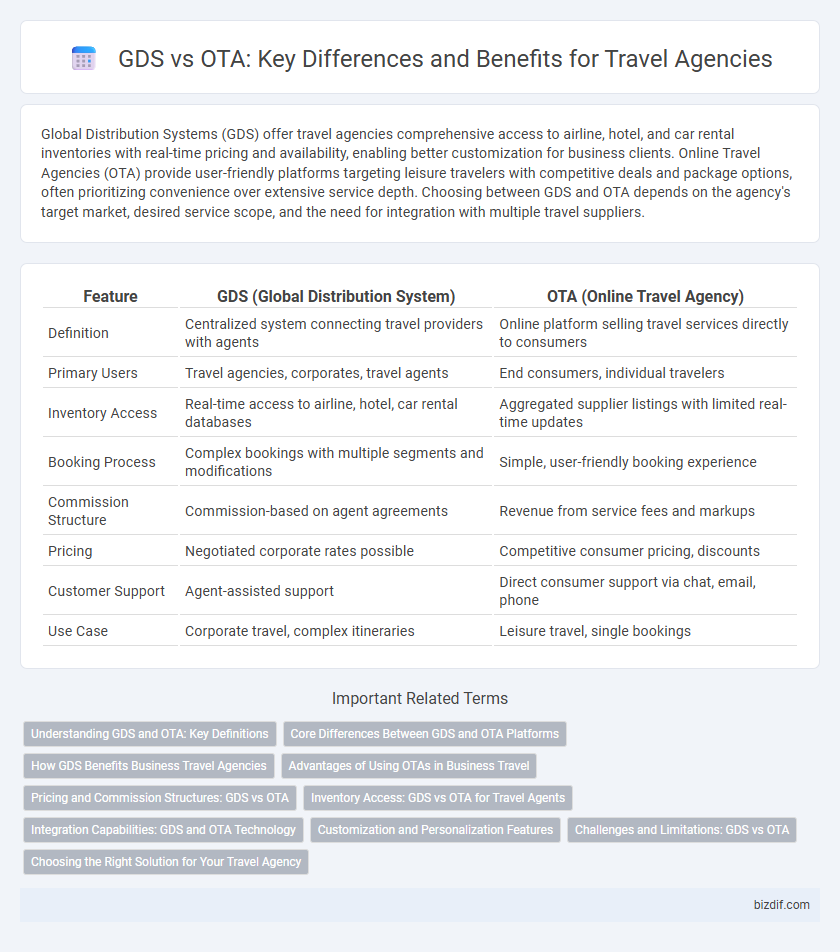Global Distribution Systems (GDS) offer travel agencies comprehensive access to airline, hotel, and car rental inventories with real-time pricing and availability, enabling better customization for business clients. Online Travel Agencies (OTA) provide user-friendly platforms targeting leisure travelers with competitive deals and package options, often prioritizing convenience over extensive service depth. Choosing between GDS and OTA depends on the agency's target market, desired service scope, and the need for integration with multiple travel suppliers.
Table of Comparison
| Feature | GDS (Global Distribution System) | OTA (Online Travel Agency) |
|---|---|---|
| Definition | Centralized system connecting travel providers with agents | Online platform selling travel services directly to consumers |
| Primary Users | Travel agencies, corporates, travel agents | End consumers, individual travelers |
| Inventory Access | Real-time access to airline, hotel, car rental databases | Aggregated supplier listings with limited real-time updates |
| Booking Process | Complex bookings with multiple segments and modifications | Simple, user-friendly booking experience |
| Commission Structure | Commission-based on agent agreements | Revenue from service fees and markups |
| Pricing | Negotiated corporate rates possible | Competitive consumer pricing, discounts |
| Customer Support | Agent-assisted support | Direct consumer support via chat, email, phone |
| Use Case | Corporate travel, complex itineraries | Leisure travel, single bookings |
Understanding GDS and OTA: Key Definitions
Global Distribution Systems (GDS) are centralized networks that enable travel agents to access and book airline seats, hotel rooms, and car rentals in real-time, connecting multiple service providers. Online Travel Agencies (OTA) are digital platforms that aggregate travel products directly for consumers, offering user-friendly interfaces and competitive pricing. Understanding the distinction between GDS and OTA helps travel agencies optimize booking strategies by leveraging GDS for professional access and OTA for broad consumer reach.
Core Differences Between GDS and OTA Platforms
GDS platforms aggregate extensive inventories from multiple airlines, hotels, and car rental services, offering real-time access to global travel content primarily used by travel agents for booking and managing complex itineraries. OTA platforms serve as user-friendly online portals directly targeting consumers, providing streamlined interfaces for searching, comparing, and purchasing travel products with instant confirmation. The core difference lies in GDS's role as a centralized distribution network facilitating B2B transactions, while OTAs operate as retail channels enabling direct B2C sales.
How GDS Benefits Business Travel Agencies
GDS (Global Distribution System) offers business travel agencies real-time access to a vast inventory of flights, hotels, and car rentals, enabling efficient booking and itinerary management. Its integrated platform supports complex travel requirements and corporate policies, improving accuracy and compliance while reducing administrative workloads. GDS enhances agency profitability by providing competitive fares and exclusive deals not always available on OTAs (Online Travel Agencies).
Advantages of Using OTAs in Business Travel
Online Travel Agencies (OTAs) provide business travelers with convenience through real-time access to multiple airline, hotel, and car rental options via a single platform. OTAs offer competitive pricing and flexible booking policies, enabling companies to optimize travel budgets while managing itineraries efficiently. Enhanced tools for expense reporting and traveler tracking improve overall transparency and streamline corporate travel management.
Pricing and Commission Structures: GDS vs OTA
Global Distribution Systems (GDS) typically operate on a commission-based model with negotiated rates, offering consistent pricing to travel agencies but often involving higher upfront fees and transaction costs. Online Travel Agencies (OTAs) leverage dynamic pricing strategies with variable commissions, frequently providing competitive rates and promotional discounts to attract customers. Pricing transparency varies, as GDS commissions are standardized, while OTA commissions can fluctuate based on volume and marketing partnerships.
Inventory Access: GDS vs OTA for Travel Agents
Travel agents using Global Distribution Systems (GDS) gain comprehensive access to diversified inventory from multiple airlines, hotels, and car rental services in real-time, enhancing booking efficiency and options. Online Travel Agencies (OTA) often provide inventory limited to their negotiated contracts and preferred suppliers, which can restrict availability and competitive pricing comparisons. GDS platforms integrate extensive global content, enabling travel agents to offer clients broader choices and dynamic pricing unavailable through most OTAs.
Integration Capabilities: GDS and OTA Technology
Global Distribution Systems (GDS) offer extensive integration capabilities with multiple travel suppliers, enabling travel agencies to access real-time inventory for flights, hotels, and car rentals through a single platform. Online Travel Agencies (OTA) rely on API integrations to aggregate data from various sources, prioritizing user-friendly interfaces and direct booking functionalities. Efficient integration between GDS and OTA technologies streamlines booking processes, enhances inventory management, and improves the overall customer experience in travel planning.
Customization and Personalization Features
Global Distribution Systems (GDS) offer travel agencies comprehensive customization through integrated booking tools and access to extensive inventory, enabling tailored travel packages. Online Travel Agencies (OTA) excel in personalization by leveraging advanced algorithms and user data to provide individualized recommendations and dynamic pricing. Both platforms enhance customer experience but differ significantly in the depth of customization and real-time personalization capabilities.
Challenges and Limitations: GDS vs OTA
Global Distribution Systems (GDS) face challenges such as high setup costs and limited flexibility, restricting access primarily to traditional travel agencies and corporate clients. Online Travel Agencies (OTA) offer wider consumer reach and user-friendly interfaces but struggle with intense competition and thin profit margins due to heavy reliance on third-party suppliers. Both GDS and OTA systems encounter limitations in real-time inventory accuracy and dynamic pricing, impacting customer satisfaction and operational efficiency.
Choosing the Right Solution for Your Travel Agency
Global Distribution Systems (GDS) provide travel agencies with extensive access to a wide range of airline, hotel, and car rental inventories, ensuring real-time availability and competitive pricing essential for comprehensive booking services. Online Travel Agencies (OTA) excel in user-friendly platforms and streamlined booking processes tailored for end consumers, often offering packaged deals and promotional offers to attract leisure travelers. Evaluating your travel agency's target market, operational scale, and technology integration capabilities is crucial for selecting between GDS's robust industry connections and OTA's consumer-centric features to optimize service efficiency and revenue growth.
GDS vs OTA Infographic

 bizdif.com
bizdif.com